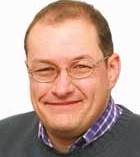Paul Rees

Paul Rees received his degree and Ph.D. in physics from Cardiff University in 1990 and 1993, respectively. Research for his PhD included the calculation of the optical properties of semiconductor lasers and the measurement of spontaneous emission from laser diodes under operating conditions. From 1994 to 1996, he was a Research Fellow at the Department of Physics, Trinity College, Dublin, Ireland, where his research included the study of self-pulsation in laser diodes and the theory of many-body effects in wide band-gap semiconductors. In 1996, he joined the School of Informatics, University of Wales, Bangor, U.K., where he was appointed Senior Lecturer in 2000. Research interests at Bangor included the effect of optical feedback in laser diodes, the use of chaos for data encryption, quantum computing and the theory of quantum-dot lasers.
In 2005 he was appointed to a Chair of Nanotechnology in the newly-formed Multidisciplinary Nanotechnology Centre at Swansea University. Current research interests include the theory of the electrical and optical properties of self assembled and colloidal semiconductor quantum dots. Recent research has involved the modelling of biological cell cycles and the use of these theories in deconvolving useful information from high throughput measurement techniques such as flow cytometry and time lapse microscopy. A major focus of current research is the investigation of the uptake of nano and micro-particles in biological cells. Using the high throughput measurement techniques to investigate the heterogeneity of this uptake for large cell populations, allowing the calculation of the statistical distributions for the number particles delivered to a cell. Recent research has involved the application of engineering systems approaches to both biology and medicine in order to deconvolve meaningful information from data.


